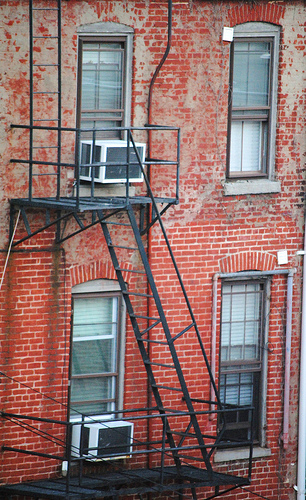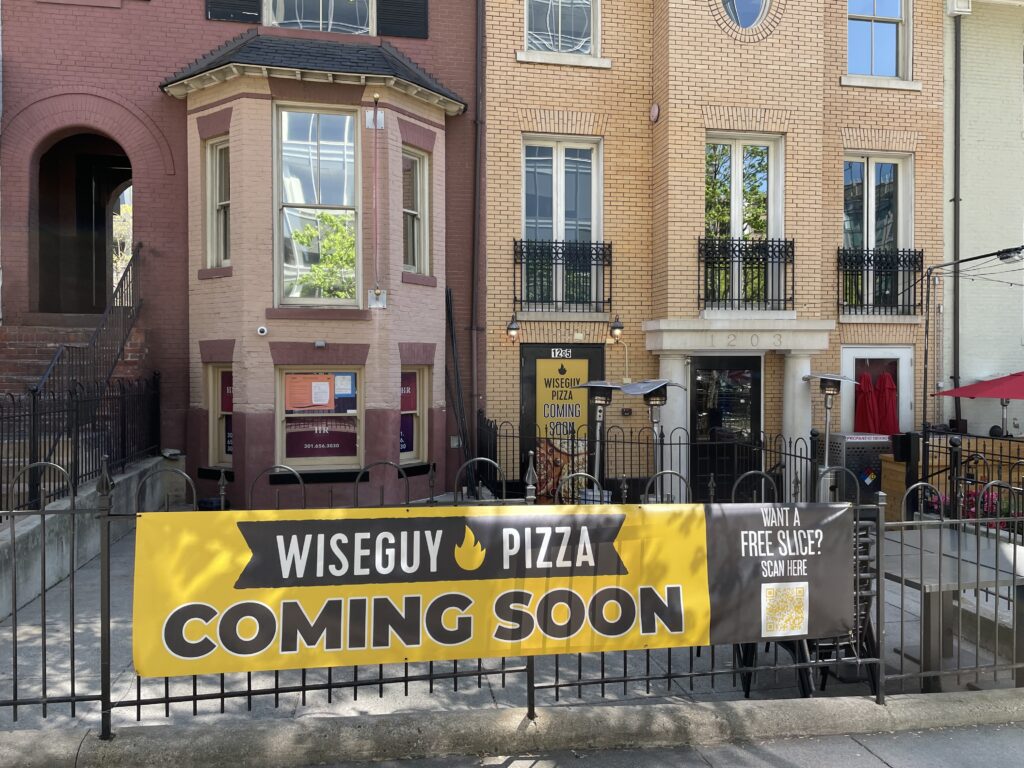
Photo by PoPville flickr user ekelly80
Griffin & Murphy, LLP, (a PoP advertiser) is a boutique law firm in Washington, D.C. concentrating its practice in real estate law (including development, finance, leasing, zoning and condominium conversions), as well as estate planning and probate, civil litigation, and business law. The attorneys of Griffin & Murphy, LLP are licensed to practice law in the District of Columbia, Maryland and Virginia. Griffin and Murphy, LLP was founded in 1981.
Please send any legal questions relating to real estate, rentals, buildings, renovations or other legal items to princeofpetworth (at) gmail (dot) com, include ‘legal question’ in the title and each week one question will be featured. I was curious about the following questions:
QUESTION:
When I purchased by historic row home in 1994 (near Eastern Market on Capitol Hill),
the English Basement 1-BR rental already had a legal Certificate of Occupancy as
initiated by previous owners. The first month after I purchased my home, I applied to
have the C of O transferred to my name, passed the required Safety Inspection, etc. So
I’ve had a legal C of O on the rental unit since that time.
I have always been told that my unit was exempt from DC Rent Control regulations.
I was unaware of the new 2006 Rent Control Act that required all rental units to get a
Business License and register as Exempt from Rent Control until my tax lawyer this year
advised me to do so, because “even though the law has been on the books for awhile,
he said….DC is just now starting to enforce the law.” I have never been informed by
the District of Columbia that I need to get a Business License and register to get an
Exemption from Rent Control. However, I voluntarily spent a day at DCRA in July this
year doing just that.
My current tenant has rented this basement rental from me for 13 years, since
September 1997. He signed a one year lease and has been on month-to-month ever
since then. Because I knew the tenant as a friend and business associate prior to him
becoming my tenant, I voluntarily kept the rent considerably below market rate all these
years…..starting at $625/month in 1997 and only $1,000/month through August of this
year. (The current market rate for my well-maintained garden-apartment unit in this nice
location is now $1,850-$2,000/month.) Due to increased expenses, higher mortgage
due to built in capital improvements to the house over the years, property tax increases,
etc., I made the hard decision to raise the rent to $1,250/month effective August 1, 2010
and gave the tenant advanced notice that it would again raise to $1,500/month effective
August 1, 2011.
More questions and answers after the jump.
Even though the rent at $1,250 is about 30% or more below market rate, my tenant
still cannot afford to stay in the apartment and has given me 30 days notice than he
intends to vacate the unit by October 31, 2010. Concurrently, since he is 61 years old,
he secured free legal counsel from the Legal Counsel for the Elderly, and is requesting
reimbursement for all rental increases imposed since 2007 when his rent was still only
$675/month — stating that since I was not properly registered with DCRA at the time of
those rental increases, that they are subject to DC Rent Control regulation and some other
claims that would only apply if under Rent Control. I’ve been notified by the DC Office
of Administrative Courts to appear at a Mediation scheduled for Nov. 12 to discuss this.
Question 1: I know that “ignorance of the law is not a defense,” however….should
not the District of Columbia also take some responsibility to notify its citizens who
may be subject to new provisions of law that may affect them — especially since I had
a legal C of O registered with the DC Government and have filed a Schedule C for
my rental income with my Federal and DC tax returns annually, I should be on a list
somewhere in DCRA of people to be notify, wouldn’t you think? Should a landlord be
held liable if DC posts a law in the ether and expects them to be clairvoyant about it?
Question 2: Even though I did not know to register for a Rent Control Exemption
in 2006, the fact remains that my rental unit has never been deemed a Rent Control
property, and would never be considered such when an application for an exemption
was filed at any point. It is not like this claim is coming from a tenant that moved in
after the 2006 law was in affect. We are talking about a tenant who has been in my
unit since 1997 when it was universally accepted that my 1-bedroom English basement
apartment was not subject to Rent Control. Should I be liable NOW, for this tenant’s
claims that would only apply if the unit was considered to be under Rent Control?
Question 3: Asked another way, how can a property that never was subject to rent
control, and never would be whenever an application was made to DC for an exemption
due to current criteria that explicitly states that buildings with 4 units or less are Exempt
from Rent Control…..how can the landlord ever be subject to claims under the Rent
Control Act of 2006 — especially when the original lease for this tenant was signed in
1997?
Question 4: Reading the Guide for Landlords & Tenants provided by DC prepared after
the Rent Control Law of 2006 was enacted, it does say that all rental units must registered
as being Rent Controlled or Exempt from Rent Control. What is DOES NOT say is that
if a registration has not been made by the landlord/owner, the property is automatically
considered to be under Rent Control and the provisions of Rent Control apply. So how
can anyone reading this make that assumption? I can see the DC Government fining
someone for not registering as required, but CANNOT see how a landlord can be subject
to liability for claims of Rent Control violations when the unit has never been considered
rent control and would never be designated as one if and when an application was made
to the DC Govt. What are my rights here? (My voluntary application for a DC Business
License and Exemption from Rent Control was in July. I passed the Safety Inspection in
August, and the License was issued on September 4, 2010. However, the rental increase
from $1,000 to $1,250 per month was effective on August 1 after having given the tenant
2 months notice prior to the increase.)
Question 5: I read somewhere online that if a Tenant claims status as “Elderly” with
special consideration given to him because of that designation, the Tenant must apply
for that designation to the Rent Administrator and also inform his Landlord of that in
writing. My tenant is using a pro bono attorney from the Legal Counsel for the Elderly.
The attorney did write me to inform me that my tenant sought their services and she is
representing him, but is that the same thing?
I appreciate any advice (or legal ammunition) you could provide to me.
ANSWERS:
Given the complexity of your questions and the fact that your tenant is represented by counsel, I would advise you to consult with an attorney prior to the mediation scheduled for November. With that said, we are happy to explain how the rent stabilization exemption process works and to discuss the defenses that are typically used by landlords when they unknowingly violate the rent stabilization requirements.
As you now know, landlords in DC are required to obtain a business license and register their rental units with the DC Department of Housing and Community Development – Rental Accommodations Division (“RAD”). The registration form that a landlord files with RAD contains a section whereby the landlord can claim an exemption from the DC rent stabilization requirements if certain criteria are met. For example, individuals who own 4 or fewer rental units are exempt from the rent stabilization requirements provided that they claim their exemption.
Many people think that a landlord is automatically subject to the rent stabilization requirements if the landlord does not claim its exemption. The penalties for violating the rent stabilization requirements are found in DC Code § 42-3509.01(a), which states that “[a]ny person who knowingly (1) demands or receives any rent for a rental unit in excess of the maximum allowable rent applicable to that rental unit under the provisions of subchapter II of this chapter … shall be held liable by the Rent Administrator or Rental Housing Commission, as applicable, for the amount by which the rent exceeds the applicable rent charged or for treble that amount (in the event of bad faith) and/or for a roll back of the rent to the amount the Rent Administrator or Rental Housing Commission determines.” This is why the attorney who wrote to you is asking for a refund of the rental increases. Additionally, she is only asking for the increases imposed since 2007 because the statute of limitations requires that tenants file a challenge to any type of rent adjustment within three years after the adjustment takes effect.
While you might technically be subject to the rental stabilization requirements for the time period before you properly claimed your exemption, the tenant cannot simply demand a rollback of the rent and expect to get it. In Boer v. District of Columbia Rental Housing Com., 564 A.2d 54, 57 (D.C. 1989), the DC Court of Appeals addressed a landlord’s failure to properly claim an exemption from the rental stabilization requirements and found that the statute establishes penalties only for “knowing” violations. The Court held that “a landlord who could prove that he or she was reasonably unaware of the requirement of filing a claim of exemption would necessarily demonstrate that the violation was not a ‘knowing’ one.” (NOTE: If you look up the Boer case you will see that the Court refers to DC Code § 45-1591(a) when discussing the potential penalties; this statute has since been recodified as DC Code § 42- 3509.01(a))
To prove that you did not knowingly violate the statute, you should argue that (1) you are not a regular landlord (this is a single English basement apartment), (2) you charged a reasonable rent (take documentation of comparables to demonstrate that the rent is still well below market rates), and (3) as soon as you were alerted to the fact that you had to register the rental unit and claim the exemption, you did so.
Regarding your last question about elderly tenant status, a tenant is defined as elderly if the tenant is at least 62 years of age and demonstrates the claim to the satisfaction of the DC Rent Administrator. If a rental accommodation is not exempt from the rent stabilization requirements, the rent charged to elderly tenants can only be increased by the change in CPI-W (it is CPI-W plus two percent for non-elderly tenants). In order to qualify for this special treatment, the elderly tenant must file a form with the DC Rent Administrator and provide a copy to his/her landlord. However, if the rental accommodation is exempt from the rent stabilization requirements, a landlord can raise the rent for elderly tenants without restriction.
This response was prepared by Mark G. Griffin and Patrick D. Blake of Griffin & Murphy, LLP. The material contained in this response has been prepared for informational purposes only and should not be relied upon as legal advice or as a substitute for a consultation with a qualified attorney. Nothing in this response should be considered as either creating an attorney-client relationship between the reader and Griffin & Murphy, LLP or as rendering of legal advice for any specific matter.
Recent Stories

Photo by Beau Finley Ed. Note: If this was you, please email [email protected] so I can put you in touch with OP. “Dear PoPville, Him, dapper chap with a light…

For many remote workers, a messy home is distracting.
You’re getting pulled into meetings, and your unread emails keep ticking up. But you can’t focus because pet hair tumbleweeds keep floating across the floor, your desk has a fine layer of dust and you keep your video off in meetings so no one sees the chaos behind you.
It’s no secret a dirty home is distracting and even adds stress to your life. And who has the energy to clean after work? That’s why it’s smart to enlist the help of professionals, like Well-Paid Maids.

Unlock Peace of Mind for Your Family! Join our FREE Estate Planning Webinar for Parents.
🗓️ Date: April 25, 2024
🕗 Time: 8:00 p.m.
Metropolitan Beer Trail Passport
The Metropolitan Beer Trail free passport links 11 of Washington, DC’s most popular local craft breweries and bars. Starting on April 27 – December 31, 2024, Metropolitan Beer Trail passport holders will earn 100 points when checking in at the
DC Day of Archaeology Festival
The annual DC Day of Archaeology Festival gathers archaeologists from Washington, DC, Maryland, and Virginia together to talk about our local history and heritage. Talk to archaeologists in person and learn more about archaeological science and the past of our






